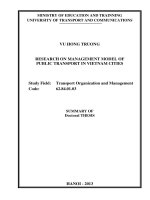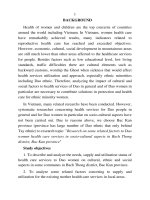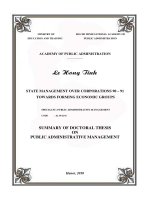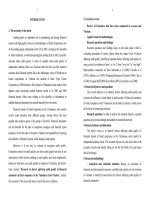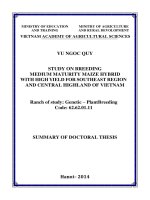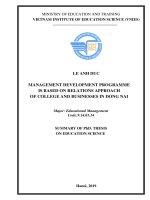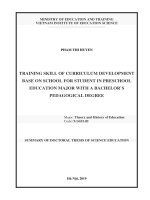summary of doctoral thesis on public administrative management state management over corporations 90 – 91 towards forming economic groups
Bạn đang xem bản rút gọn của tài liệu. Xem và tải ngay bản đầy đủ của tài liệu tại đây (196.13 KB, 40 trang )
MINISTRY OF
HO CHI MINH NATIONAL ACADEMY OF
EDUCATION AND TRAINING
PUBLIC ADMINISTRATION
ACADEMY OF PUBLIC ADMINISTRATION
----------------
Le Hong Tinh
STATE MANAGEMENT OVER CORPORATIONS 90 – 91
TOWARDS FORMING ECONOMIC GROUPS
SPECIALTY: PUBLIC ADMINISTRATIVE MANAGEMENT
CODE
: 62 34 82 01
SUMMARY OF DOCTORAL THESIS
ON
PUBLIC ADMINISTRATIVE MANAGEMENT
Hanoi, 2010
This work has been completed at: Academy of Public Administration
(National Academy of Public Administration)
Scientific Instructor: Dinh Van Tien Prof.Dr.
Judge 1: Luong Trong Yem Prof.Dr.
Judge 2: Nguyen Manh Kiem Prof.Dr.
Judge 3: Vu Huy Tu Prof.Dr.
The Thesis shall be defended before the State level Thesis Assessment
Council held at:
Academy of Public Administration, No. 77, Nguyen Chi Thanh, Dong Da,
Hanoi
at………. hours, on November, 13th 2010
The Thesis can be further referred to at: Academy of Public Administration
1
PREFACE
1. Rationale of the Subject
In implementing renovation, building the socialist-oriented market economy in
the tendency towards international integration, setting up and developing Economic
Corporations, Groups which are big and with competitive potential on both domestic
and foreign markets become strategic goal of the State of Vietnam. This is regarded
by the Party and the State as a major policy in the country’s economic guidelines. In
the course of building strong Economic Corporations, Groups, State management
plays a decisive role. State management creates legal standards, conditions,
premises…for State enterprises to develop into economic groups sufficiently strong,
playing the core role in the economy. To achieve that goal entails unceasing
completion and renovation of State management over Corporations 90-91 and
economic groups of the State. This is a new issue, which is to be done and completed
at the same time in Vietnam. For that reason, research, in a comprehensive and
specific manner, both theoretically and practically, into the State management over
State-owned enterprises towards forming strong economic groups is a pressing need
of the cause for State management renovation in terms of economic and public
administrative reform.
Being a senior manager in Corporations 90-91, having deep approach to reality
and gaining some certain experiences, I opt to choose “State Management over
Corporations 90-91 towards Forming Economy Groups” as the subject for my
Doctoral Thesis on Public Administrative Management. Research on this subject on
the one hand can solve the pressing issues imposed to our country, in conformity with
the public administrative management profession, particularly, it will enable
combination of theoretical study, research with practical activities of myself.
2
2. Research Objectives
-
To systemize, with supplementing and completing, scientific grounds for
State management over Corporations 90-91 towards forming economic
groups.
-
To analyze the situation of forming and operation of Corporations 90-91
towards forming economic groups in Vietnam. From that, to point out which
pressing issues that needs to be handled in completing State management over
Corporations 90-91 towards forming economic groups.
-
To propose direction, solution system as well as conditions for carrying out
solutions for completing as to State management over Corporations 90-91
towards forming economic groups.
3. Object and Scope of Research
- Research Object
Object of Thesis research is State management over Corporations 90-91
towards forming economic groups.
- Research Scope
The Thesis research is at a macro level, mainly focusing on regimes, policies,
mechanisms, contents of State management over Corporations 90-91 towards
forming economic groups within Vietnam at the present time.
4. Method for Research
Based on principles of Marxism-Leninism; Ho Chi Minh’s thoughts; points of
view, guidelines of our Party and State; dialectical materialist, dialectical historical
methodology; in the thesis, the following main methods were used:
- Analyzing, collating, comparing;
- Generalizing;
- Grouping;
- Field surveying;
- Investigating;
- Statistic analyzing.
3
In addition, the published results of researches relating to the subject at home
and abroad were also used in the thesis.
5. New Scientific Contributions of Thesis
First, in terms of theory,
-
Points out criteria of cooperation for differentiation with other types of
enterprise;
-
Provides theoretical grounds for developing Corporations 90-91 towards
forming economic groups;
-
Provides the conception of State management over Corporations 90-91
towards forming economic groups;
+ Points out the subject, object of management;
+ Proposes methods for management and tool system for implementing the
methods.
-
Sets up in a systematic manner contents of State management over
Corporations 90-91 towards forming economic groups.
These are theoretical issues that no documents available have touched upon.
Second, in terms of practice,
On the basis of analyzing the situation of Corporations 90-91, economic
groups, the process of developing Corporations 90-91 towards forming
economic groups and the real state of State management over Corporations 9091 towards forming economic groups, the thesis points out the results
achieved, its limits and their causes. In particular, it provides the five pressing
issues which need to be handled in completing State management over
Corporations 90-91 towards forming economic groups, namely:
-
Creating environment, abilities, conditions for economic corporations, groups
to accumulate, concentrate, and strengthen their competitiveness;
-
Self-control, self-responsibility of corporations as well as their subordinate
companies, entities;
-
Executive order in management;
4
-
Managers of corporations and their subordinate entities;
-
Legal grounds for the relationship between holding company with its affiliates
and among the affiliates within the corporation.
Third, research results,
Proposes scheme and solution system (6 solution groups) and conditions
(5 condition groups) for completing State management over Corporations 90-91
towards forming economic groups.
Especially, in the thesis, specific ways, roadmaps for carrying out the solutions
were designed.
New scientific contributions of the thesis shall serve as grounds for making
policies on renovation of State management over Corporations 90-91 towards
forming economic groups.
6. Thesis Composition
State Management over Corporations 90-91 towards Forming Economic Groups
Preface
Chapter 1
Scientific Grounds for State Management over Corporations 90-91 towards
Forming Economic Groups
Chapter 2
Real Status of State Management over Corporations 90-91 towards Forming
Economic Groups
Chapter 3
Scheme and Solution System for Completing State Management over
Corporations 90-91 towards Forming Economic Groups
Conclusion
5
OVERVIEW OF RESEARCH SITUATION
Economic group is the modern economic organization form in countries over
the world. In competitions on the market, the economic group form demonstrates its
many advantages. That is why in other countries as well as in Vietnam, great
attention is being paid by the State, scientists to the economic group form in both
respects of theory and practice.
To date, with reference to major State-owned enterprises, including economic
corporations and groups, there exist innumerable State legal documents, scientific
works and materials at home and abroad dealing with this issue.
Among the above works and researches, their authors usually concentrate on
the process of forming and developing of groups in general: chiefly on history
relating to the formation of economic groups, politico-socio-economic conditions,
market development; some workers also touch upon the elements, circumstances for
the formation and development of economic groups in general and of Vietnam during
the process of renovation and integration in particular.
However, State management over Corporations 90-91 towards forming
economic groups has not yet been dealt with in such works. Theoretically, many
contents, conceptions (for instance, theory of the development of Corporations 90-91
towards forming economic groups, conception of State management over
Corporations 90-91 towards forming economic groups, contents of State management
over Corporations 90-91 towards forming economic groups…) were not referred to.
These are also the main contents with which the thesis will deal on a systematic,
concrete way, both theoretically and practically, and proceeding from that, to propose
solutions for completing and conditions for implementing as well. In other countries,
particularly those with developed market economy, during economic development
process, economic groups were formed and constitute a mode of organizing
production, which plays a special role in the economy. Building and completing
economic group has been under research for long and innumerable workers by
6
scientists have been announced. Nevertheless, the mode of organizing production of
Corporations 90-91 was invented only by Vietnam and the development and
conversion of 90-91’s corporations into economic groups are also the exclusive form
in Vietnam’s economy. State management over Corporations 90-91 towards forming
economic groups is the exclusive task of the State of Vietnam. In the developed and
developing countries over the world, there have never been such as form, thus no
documentation touching upon this issue is available theoretically and practically so
far.
It is possible to arrive at the conclusion that the thesis research subject, as well
as the contents that it deals with, analyses, explains, does not coincide with any other
scientific research work. By researching in a specific, systematic way, both
theoretically and practically State management over Corporations 90-91 towards
forming economic groups, this can be taken as the first work of this kind.
Research on “State Management over Corporations 90-91 towards Forming
Economy Groups”, therefore, will surely be of certain value, theoretically and
practically, for the science of public management in general, including State
management over Corporations 90-91 towards forming economic groups, and
especially it would make valuable scientific contributions to the policy-making
process in reality.
CHAPTER 1
SCIENTIFIC GROUNDS FOR STATE MANAGEMENT OVER
CORPORATIONS 90-91 TOWARDS FORMING ECONOMIC GROUPS
1.1.
Overview of Corporations 90-91, Economic Group and Formation of
Economic Group
1.1.1 Awareness of Corporations 90-91
“Corporations are large-sized businesses comprised of many member
companies, enterprises manufacturing the same type of product or parts of product;
7
trading in the same area; having close possession relationship, under a unified
control, on the basis of assignment, decentralized administration between the
Corporation and its member entities on the aspects of activities for production and
business”.
Criteria for Differentiating between Corporation and Company:
-
Corporation is of large size in terms of capital, labour and scope of activity.
- Corporation’s operations conform to certain lines of products, services.
- Corporations are usually closely structured lengthwise; with assigned,
decentralized administration in accordance with task and duty of each
entity, level of business.
The above criteria for Corporation constitute the form of organizing business
developed from companies in order to meet the requirements for competition of the
modern market economy.
Pursuant to Article 44 of State Business Law:
“State Corporation may have the following types of member entity:
+ Financially independent entities;
+ Financially dependent entities;
+ Non-productive entities.
Member entities of State Corporation have their own seal, can open bank
account in conformity with mode of payment by State Corporation.
Corporation is structured according to several models as follows:
First, as per the relationship among the member entities, Corporations are
organized according to one of the following three:
- Model of horizontal linking;
- Model of lengthwise linking;
- Model of mixed linking.
8
Second, as per size of capital of Corporation:
- Corporation 91 (established under Decision No. 91/TTg dated March 7,
1994), according to scheme upon establishment, it had to have a minimum
chartered capital of VND 1,000 billion.
- Corporation 90 (established under Decision No. 90/TTg dated March 7,
1994), those Corporations established according to this model has to have a
minimum chartered capital of VND 500 billion.
1.1.2. Economic Groups
1.1.2.1. Generalization of Features and Conditions for the Formation of
Economic Groups
Definition of Economic Group: Economic group is an economic group
comprised of economic entities operating within a line or lines of business, within a
country or countries, having close relation in terms of economic, technological, and
marketing benefits. The chief goal of economic groups is to optimize profit on the
basis of husbanding resources of labour, technology, finance, intelligence…
a. Basic Features of Economic Group
Economic group is of large size in terms of capital, turnover and scope of
activities.
- Multi-disciplinary, multi-area activities;
- Diverse in terms of organization and ownership;
- Economic groups often have R & D centers;
- Economic groups are often organized, managed, operate in clear order, and
controlled in an intensive manner.
b. Conditions for the Formation of Economic Groups:
- Effect of rule of competition in the market economy;
- Effect of advances of science-techniques and technology;
- Demand of stimulating and concentrating capital, reducing business
expenses, and minimizing payable taxes;
9
- The tendency toward globalization has been becoming a decisive factor
which governs the formation and development of economic groups.
1.1.2.2. Types of Economic Group
First, classification of economic according to level of linking
First, Cartel is a type of business group.
Second, Syndicate is a special form of Cartel.
Third, Trust is a business group, formed through the exclusive union of
business and production organizations as industrial businesses.
Fourth, Consortium is a complex encompassing exclusive banking
organizations combined together.
Fifth, Concern is the most popular form of business group today.
Sixth, Conglomerate is the type of business group formed by attracting equity
from companies with highest profits via activity of trading in securities on the market.
Seventh, Transnational Corporation is an exclusive capital corporation whose
production and business activities are on a very large scale that crosses the border of
a country.
Eighth, Multinational Corporation.
Second, pursuant to mode of formation
First, Form of Horizontal Linking
Is the form in which companies in the same line can link together according to
the pre-set objectives to form up business groups.
Second, form of lengthwise linking
This is the form of linking economic groups lengthwise. Affiliated companies
have a link as per technological process with the holding company.
Third, Form of Mixed Linking
According to this mode, groups often run in a multi-disciplinary and multi-area
manner, thus capable of spreading investment capital risks and avoid violation of
antitrust laws of governments.
10
Fourth, Form of Voluntary Linking between companies that takes place
when companies volunteer to negotiate around a company having great economic
potential or holding a key position of the technological line.
Fifth, Mode of Compulsory Linking, which takes place in the two following
cases:
- When a company has a great financial potential (holding company) to take
over other companies.
- Via the form of company re-organization.
Third, pursuant to form of ownership.
First, single-proprietary economic groups.
Second, multi-proprietary economic groups.
Fourth, pursuant to nature of linkage
First, economic group is formed according to the rule of “soft linkage” also
known as “economic linking” group.
Second, economic group is formed on the basis of “hard linking” meaning the
member companies are “closely linked in terms of capital”. According to this
mode, there are the following popular models:
- Model 1: Sample structure.
- Model 2: Holding company directly holds shares of affiliated companies
not directly under it.
- Model 3: Among the counterpart affiliated companies holding one
another’s shares.
- Model 4: The holding company is an affiliated company of some other
companies.
1.1.2.3 The Role Played by Economic Group in the Market Economy
First, to attract, accumulative, and expedite capital circulation rate.
Second, to transform the socio-economic structure.
11
Third, to apply, develop science and techniques, receive and transfer technology.
Fourth, to train and develop human resources.
Fifth, to promote economic integration.
In Vietnam, this role is displayed in the following:
- Via the economic groups, the State have conditions for accumulate and
concentrate important resources for the cause of industrialization and
modernization.
- State corporations serve as a core of the State economic sector - the key
sector of the economy.
- State corporations are an important factor in transforming economic
structure, maintaining high growth rate and stabilizing economy, expanding
export, and increasing income for the State Budget.
- State corporations generate many jobs; train human resources for the
society.
- State corporations constitute an important factor in expediting the
conversion to the market economy, openness and integration as oriented by
the State of Vietnam.
Nevertheless, besides the positive role, the formation of State corporations,
with their advantages in terms of capital, labour, market, may result in such
issues as monopoly, unwholesome competition, price manipulation, tax
fraud, environmental destruction…Thus, there should be the State
management in order to reduce, stop negative aspects that may arise in the
market mechanism…
1.1.3 Theory of the Development of State Management over Corporations
90-91 towards Forming Economic Groups
1.1.3.1 Development of Corporations 90-91 towards Forming Economic
Groups is a Necessity and also A Major Policy on Economy in Vietnam.
12
First, this is a policy, guideline in economic renovation of the Party and State
of Vietnam.
Second, in operation, the Corporations 90-91 have shown their weaknesses in
capacity of competitiveness in the home and international markets.
Third, possibility to develop the Corporations 90-91 towards forming
economic groups is very high.
Fourth, that the legal environment is built and completed also create
favourable conditions for the inner force development of the member corporations
and enterprises.
Fifth, the economic environment of Vietnam is fully-fledged for the formation
of economic groups.
1.1.3.2 Issues of Concern in order to Ensure the Development of the
Corporations 90-91 into economic groups with good results.
First, size and scope of capital accumulation.
Second, business specialization, cooperation and partnership.
Third, exercise of the State’s ownership.
Fourth, policy mechanism for development of corporations into economic groups.
1.1.3.3 Conditions for Developing Corporations 90-91 towards Forming
Economic Groups
First, production must reach a certain level of socialization thus resulting in the
object requirement for the choice of organizing an economic group on a large scale
and with high concentration on production.
Second, the market economy must reach a certain level and some considerably
complete market structure must be established.
Third, that the considerably sufficient and complete legal documentation shall
create the system of regulations and policies relating to the formation and
development of economic groups.
13
Fourth, those corporations to be developed into groups must be sizeable
enough in terms of capital, including registered capital of the holding company, total
registered capital of the corporation, minimum number of member enterprises, legal
entity status of the members…
Fifth, conditions in terms of human resources, management body, level of
science and technology…
These are issues that need to be considered when developing Corporations
90-91 towards forming economic groups.
1.2. Grounds for State Management over Corporations 90-91 towards
Forming Economic Groups
1.2.1. Conception of State Management over Corporations 90-91 towards
Forming Economic Groups
State management over Corporations 90-91 towards forming economic groups
means that the State will use a combination of tools of law, mechanism of policies,
organization of human resources, finance… to influence, adjust activities by
Corporations 90-91 in order to create premises, conditions for corporations to
develop toward forming economic groups.
The relationship between the State and Corporation 90-91 in State management
over Corporations 90-91 towards forming economic groups is represented by:
+ State: Subject of management.
+ Corporations 90-91: Object of management.
+ Activities by Corporations 90-91: Object of management.
14
The relation above is represented in the following diagram:
State
Subject of management
Activities by
Corporations 90-91
towards forming
economic groups
Object of management
Subject of management
State management over Corporations 90-91 towards forming economic groups
is performed from two angles:
- The State manages Corporations 90-91 with the function of administrative
management of the State over the types of business.
- The State manages Corporations 90-91 as the owner. To exercise the
management over Corporations 90-91, apart from the general mode of State
administrative management, the State will use the following main modes
(represented in the diagram below):
First, direct administrative mode.
Second, indirect mode via market.
The important matter here is that the management will not be loose nor
executive order shall be imposed.→
1.2.2 Rationale for the State management over Corporations 90-91
towards forming economic group.
First, proceeding from the inherent role played by the State in the economy in
general and in the Corporation 90-91 in particular.
Second, proceeding from the role as owner of capital in Corporations 90-91
and strategic intention of building strong economic groups of the State.
15
Third, through its management over the Corporations 90-91 towards forming
economic groups, the State will take the initiative in adjusting operations by
economic groups in keeping strictly with the set objectives, at the same time
overcome shortcomings and inadequateness that cause obstruction to corporations.
Fourth, proceeding from requirements for development of Corporations 90-91.
Fifth, proceeding from requirements for fighting against negativity, corruption
in the course of developing Corporation 90-91 towards forming economic groups.
From all matters above, it can be affirmed that State management over
Corporations 90-91 towards forming economic groups is an objective demand
according with the State’s strategy in the course of building the modern market
economy in the tendency toward international integration.
1.2.3 Requirements of State management over Corporations 90-91
towards forming economic groups
First, ensuring the process of developing Corporations 90-91 into economic
groups will be prompt, in stable and effective operation.
Second, in conformity with the law.
Third, the State will not interfere by giving executive orders; expanding the
right to self-control; bearing self-responsibility for corporations when these are
converted to economic groups.
Fourth, publicity
First, publicity in advance
Second, publicity in arrears
Firth, strengthening activities of inspecting, checking, supervising to detect
and handle timely and completely offenses in the course of developing Corporations
90-91 to form up economic groups.
16
1.2.4 Contents of State Management over Corporations 90-91 towards
Forming Economic Groups
1.2.4.1. Contents of State Management over Enterprises including
Corporations 90 – 91
First, building the country socio-economic development strategy of the
sector, area, locality on the annual and long-term basis.
Second, the State issues a system of legal documents to establish conditions
and environment for enterprises including Corporations 90 – 91.
Third, the State uses macroeconomic policies for regulating, encouraging
supports for enterprises including Corporations 90 – 91.
Fourth, stipulating administrative procedure regulation to realize the
relationships between and among State management bodies and enterprises including
Corporations 90 – 91.
Fifth, organizing inspection, check over enterprises including Corporations 90 – 91.
1.2.4.2 Contents of State Management as Owner over Corporations 90-91
towards Forming Economic Groups
First, issuing regulations on necessary conditions, criteria for permitting
Corporations 90 – 91 to develop into economic groups.
Second, stipulating administrative procedures for Corporations 90 – 91 to
realize when converting to economic groups.
Third, appraising, approving schemes for converting of each Corporation.
Fourth, carrying out provision of initial capital, assets for Corporations after
converting.
Fifth, appointing representatives of the State to take direct control over
enterprises within economic groups.
Sixth, approving financial mechanism of economic groups.
17
1.3. Foreign Experiences regarding State Management over Corporations
and Economic Groups and the Issues that can be Drawn for Research of Vietnam
1.3.1. Foreign Experiences
1.3.1.1. South Korea
1.3.1.2 Japan
1.3.1.3 Indonesia.
1.3.1.4 Malaysia
1.3.1.5 China
1.3.2. Issues that can be Drawn for Research of Vietnam
First, economic group is the form of corporate widely applicable to developing
countries.
Second, economic groups often take in member entities as per objective
programs of the State.
Third, economic groups are set up to create key economic sectors including export.
Fourth, economic groups take hold of sections, phases that will determine the
success or failure of the country economic development objectives.
Fifth, very flexible internal management mechanism.
Six, the State relies on economic groups to control the national economy.
CHAPTER 2
REAL STATUS OF STATE MANAGEMENT OVER CORPORATIONS 90-91
TOWARDS FORMING ECONOMIC GROUPS
2.1. Generalization of Corporations 90-91 and Process of Developing into
Economic Groups in Vietnam
2.1.1. Formation and Operations of Corporations 90-91
Pursuant to Decisions No. 90 and 91/TTg dated March 7, 1994 by the
Government, Corporations 90 and 91 were formed on the basis of re-organizing and
restructuring State-owned enterprises. These are State Corporations.
18
Corporations 90-91 encompass financially independent entities; financially
dependent entities; non-productive entities. Member entities of Corporations have
their own seal, are permitted to open their own bank accounts in conformity with
method of payment by Corporations. Financially independent entities have their own
Charter approved by Board of Directors of Corporation under provisions of Business
Law and Regulations on State Corporations. Financial regimes and economic
accounting of Corporations conform to the Government’s regulations.
By the end of February 2008, throughout the country, there were 94 State
economic groups, corporations (07 economic groups and 87 corporations of the
State). The State capital in 19 economic groups, corporations of special grade
accounted for 84% of the total of State capital in 94 economic groups, corporations of
the State. The State capital in 2008 increased by 13% compared with that of 2007,
which mainly came from after-tax profits, re-assessment of assets in the process of
restructuring, converting and capital surplus from amortization of member entities.
Table 2.1: Norms of Operation by Groups, Corporations
Norms
2008
1. Total State Capital (VND thousand billion)
Compared
with 2007
440
+ 13%
1.044
+ 30,7%
3. Total Profit before Tax (VND thousand billion)
125
+ 76%
4. Rate of Return (3)/(1)
28%
5. Total Payment to the State Budget (VND
182
+ 34%
6. Total Investment Capital (VND thousand billion)
177
- 5%
- Including in the areas of securities, insurance,
7.2
- 26%
2. Total Turnover (VND thousand billion)
thousand billion)
banking, real estate, investment funds (VND
thousand billion)
Today, State enterprises contributions make up approx. 40% of GDP,
generating 39.5% of industrial output, over 50% export value and 28.8% of total
19
domestic income (excluding collection from crude oil and import tax), creating jobs
for 1.1 labourers with an income of VND 3.5 - 4.5 mil/person/month.
Besides the results obtained from their activities, State corporations also reveal
lots of inadequateness in accumulating, concentrating capital by corporations in
management organization, in the relationship among the entities of corporations. One
thing of great importance is that the level of accumulating and concentrating capital
by corporations is still low thereby reducing their competitiveness, particularly when
Vietnam joins the WTO.
2.1.2. Process of Formation of Economic Groups according to the HoldingAffiliate Company Model from Corporations 90-91
2.1.2.1. Models of Pilot Economic Groups in Vietnam
First, Corporation according to the Holding-Affiliate Company Model with the
holding Company being a State one.
+ Holding Company is a State company.
+ Affiliated companies are companies with governing equity from Holding
Company.
+ Holding Company may have affiliated companies being the ones without
governing equity from Holding Company.
+ Holding Company has functions for directly involving in operation and
investing finance in other enterprises or merely investing finance in other enterprises.
Second, Holding Company is a one-member company limited
- Holding Company:
Holding Company has functions for directly involving in operation and investing
finance in other enterprises or merely investing finance in other enterprises.
- Affiliated Company:
Affiliated Companies are the companies which meet one of the following
conditions:
20
+ 100% of their chattered capital is held by Holding Company.
+ Shares, governing equity (over 50% of chartered capital or total number of
common shares issued of the company) is held by Holding Company.
+ The majority or all members of Board of Directors, General Director
(Director) of the company is directly or indirectly appointed by the Holding Company.
+ Charter of the company is decided to be amended, supplemented by the
Holding Company.
Pursuant to Business Law 2005, Economic Group is one of the forms of
combining the companies having long-term ties to one another on the aspects of
economic, technical, market benefits and other operations.
2.1.2.2. Process of Forming Some Pilot Economic Groups from Corporations
90-91
a. The formation of economic groups is the result of the process of
restructuring and renovation of State Corporations.
On the ground of selecting among the Corporations 91, during 2005 – 2006,
the Prime Minister decided to approve the scheme for converting 7 Corporations 91
to operation according to the model of economic groups, in which many affiliates are
joint-stock or associated companies. The Prime Minister also promulgated
exceptional documents for adjusting every pilot ethnic group. These included
Decisions by the Prime Minister approving scheme for setting up State economic
groups; setting up holding company of group; appointing members of Board of
Directors of Holding Company.
b. Steps for setting up pilot economic groups
Piloting encompasses 4 steps:
Selecting enterprises to be converted;
Approving scheme for conversion (Prime Minister decides after
considering proposals by ministries of: Planning and Investment, Finance,
Internal Affairs, Labour – War Invalids and Social Affairs, the ministry
21
that govern line of business run by corporation and conclusion by
Standing Committee of the Government).
Approving Regulations on Organization and Operation of Holding Company
(by the Prime Minister).
Approving Regulations on financial management of Holding Company.
State Economic Groups established:
+ PetroVietNam;
+ Vietnam Electricity (EVN);
+ Vietnam Coal and Minerals Group (Vinacomin);
+ Vietnam Ship Building Industry Group (VinaShin);
+ Financial – Insurance Group (Bao Viet);
+ Vietnam Post and Telecommunications Group (VNPT);
+ Textile and Garment Group (Vinatex);
+ Rubber Group (VRG);
+ Real Estate Investment and Business Group;
+ Vietnam Industry and Construction Group;
+ Vietnam Housing and Urban Development Group;
+ Vietnam Chemical Industry Group;
Capital for these economic groups is mainly from the State. Their operations
basically conform to the former modes.
The management mechanism of Holding Company encompasses:
+ Board of Directors;
+ Monitoring Committee;
+ General Director and Deputy General Directors;
+ Chief Accountant;
+ Assistant Apparatus.
Members of group (affiliated companies) comprise:
22
+ Companies with 100% of chartered capital held by Holding Company;
+ Companies with more than 50% of chartered capital held by Holding
Company;
+ Companies with less than 50% of chartered capital held by Holding
Company;
+ Non-productive entities:
c. Production and business results of economic groups
2.1.3. Assessing Pilot Conversion of Corporations 90-91 to Economic Groups
2.1.3.1. Results obtained
First, increase in owner’s capital.
Second, economic groups have expanded their range of operation, not only
concentrating investment on the domestic but also initally on the froreign markets.
Third, formation of the multi-owership structure among economic groups.
Fourth, State economic groups together with corporations continue maitaining
their decive role, ensuring the supply of necessary materials, goods, services for the
eonomy, creating substantial sources of income to the State budeget, contributing to
eonomic growth and maintaining macro regulation of the State.
Fifth, economic groups have participated well in charitable activities, thus
contributing to ensuring social security.
2.1.3.2. Restrictions
First, size of capital owned by groups is still too small compared with
requirements for development and integration.
Second, operational efficiency of economic groups does not correspond with
the resources invested, many objectives set for groups have not been achieved.
Third, the model of organizing management for economic groups has not yet
been clearly determined.
Fourth, the model of organizing production and business, mechanism for
managing internal affairs of economic groups have not yet been clearly determined.
23
2.1.3.3. Causes
- The mechanism for management of the holding company has been used by
economic groups as duty and function for managing the groups.
-
Mechanism
for
personnel
management,
assignment,
decentralized
administration, salary, bonus management; clear-cut distinction between State
management and State capital management as to economic groups.
- Management in economic groups is still heavily influenced by the former State
management mechanism.
- There is no clear-cut distinction between the function for State administrative
management from the function for State owner management as to economic groups.
- Officers’ management level cannot meet new management requirements.
These are issues that need to be renovated by completing State management
over economic groups.
2.2. Real Status of State Management over Coporations 90-91 towards
Forming Economic Groups
2.2.1.
Promulgation
of
legal
documentation
system
relating
to
Corporations 90-91 and economic groups converted from Corporations 90-91.
The State promulgates legal documents regulating operations by enterprises,
including Corporations 90 – 91 and economic groups.
According to the aforesaid legal documents, the State’s mechanism for financial
management as to State corporations has the following main contents:
- Corporations carry out the rule of business accounting, using income to cover
expenses, at the same time, have to carry out the task of serving for the State.
- The State step by step implement “softening” the input price mechanism.
- The States allocates capital to corporations for managing and using.
- Corporations are permitted to retain fixed asset fundamental depreciation for
re-investing and renovating machines and equipment.
24

